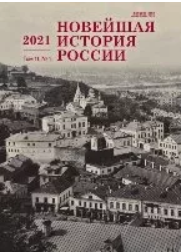Русские военные инвалиды в Польше в 1920–1930-е годы: организация, персоналии, повседневность
Russian Disabled Veterans in Poland in the 1920s – 1930s: Community, Personalities and Daily Life
Author(s): Svetlana I. NikonovaSubject(s): Military history, Social history, Government/Political systems, Interwar Period (1920 - 1939), Migration Studies
Published by: Издательство Исторического факультета СПбГУ
Keywords: Russian military emigration; Poland; disabled veteran; humanitarian activity; charity; emigrant community;
Summary/Abstract: The article examines the dramatic history of the survival of Russian disabled veteran emigrants in Poland in the 1920s–1930s. The main aim is to highlight issues of the financial situation of disabled veterans, their legal status and self-organization, and the humanitarian activity of the Union of Russian Disabled Veteran Emigrants in Poland. The paper reflects the adjustment difficulties of disabled veterans in Poland, aspects of the mixed attitude of the Polish authorities to Russian emigrants, and the internal problems of the emigrant community. Continuous support and assistance to disabled people and their families, and care for disadvantaged fellow countrymen are he focus. The article shows the efforts of the Board of the Union of Russian Disabled Veteran Emigrants in Poland, not only to support disabled people financially, but also to encourage the emigrant community’s morale and to oppose the marginalization of disabled veterans. The paper states the fundamental reasons for moral problems associated with the physical well-being of disabled people, the lack of prospect awareness, the loss of hope for a status change and receiving Polish citizenship, and the loss of connections with Russia. The article presents features of everyday life of the Russian disabled veteran emigrants; it observes the policy of the Union’s Board in relation both to Polish authorities and to members of the Union. In the 1920s and 1930s the Union of Russian Disabled Veteran Emigrants remained the only uniting center for disadvantaged Russian people, and its leaders honestly fulfilled their duties. The author used materials from the documents of the Russian archives (State Archive of the Russian Federation, Russian State War and Historical Archive), and newly available documents of the Lithuanian Central State Archive (LCVA).
Journal: Новейшая история России
- Issue Year: 11/2021
- Issue No: 36
- Page Range: 674-685
- Page Count: 12
- Language: Russian

